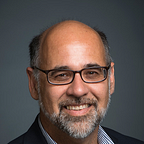A LITTLE FORBEARANCE PLEASE
Set a Good Example for Young People
I’ve been getting myself in trouble lately. My wife thinks that I might be a bit too strident about all of this. All of this, of course, is the COVID-19 crisis. She’s a community health nurse and educator, so she has her opinion. She’s just more diplomatic.
I’ve been posting on Facebook and other media reminding my friends and family not to travel. I keep seeing photos of them at the beach or in places in the U.S. that have low rates of infection (where maybe the people living there would prefer they stayed at home).
Forbearance is when you have a right to take an act but refrain from doing it. It’s a legal concept (I’m a former lawyer) and considered mostly in terms of enforcing payment on a debt. To forbear in the COVID-19 context means to check oneself from engaging in activity that though you can legally do, you don’t do for public health, safety or even moral reasons. Americans tend to have a hard time restraining themselves. Just consider the need to always increase profits and purchase more and more non-essential consumables.
No doubt we’ve all heard public health experts and some elected officials say that we are in the “fight of our lives” right now. I’m not insensitive to the desire for people to engage, but the need to engage, doesn’t mean doing it. I do take the argument about mental health needs, so I can justify some being “out and about” — but it can’t be an excuse for the excess that seems to be going on. And I do understand the need to support businesses and employees (which maybe should be more the obligation of government now, rather than having consumers put themselves at risk). My mother claims that she needs to physically go to the grocery store but can’t make a convincing argument why that makes better sense than having groceries delivered. She is 85 and lives in Florida.
We all saw the crowds over the July 4th weekend at beaches and bars with little distancing and scarce masking. I do realize that with every social situation there is a different level of risk: going to the beach is less risky than going to a bar. But the beach is riskier than creatively finding something to do at home or in your own neighborhood. And it’s a slippery slope: can you go to a beach bar?
It seems that there is a lot of gaming going on. Rather than figuring out how to stay the course, people are trying to see what corners they can cut, what risks they can take, all in order to keep things as normal as they can. And that is the point. This isn’t normal, and we shouldn’t treat it as such. This is an urgent global health crisis that we haven’t experienced in over 100 years.
I’m most concern about the message we are sending to young people. Young Americans are experiencing a global crisis that even their parents have not experienced. It will be a seminal event in their lives, like 9/11 was for a previous generation. And consider that the present situation might be a preview to the looming (some say current) global climate catastrophe. Teaching young people to live without and limit excess for the benefit of the common welfare is imperative right now. We should be teaching them important lessons on resilience. But this is hard to do when their parents and adults are not modeling it.
Self-denial, sacrifice, and forbearance are important lessons and mind sets, but not completely alien to Americans. Many Americans experience it in personal and often spiritual ways. Being raised Catholic, I know that Lent is a time of sacrifice. And Ramadan for Muslims is an intensive period of fasting. Why can’t we apply that same fortitude now?
The present hardship for Americans, no matter how difficult it might appear, is a pittance compared to what people experience around the world who live in war zones, in massive displacement camps, and in places where getting the next meal is a real question of survival. Our present inconvenience is a quintessential “first world” problem. It can reveal self-centeredness when faced with a crisis that urgently demands us to be our best human beings.
